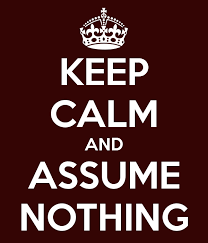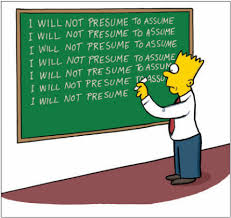Assumptions: open badges


Underpinning the Open Badges project is the basic premise of offering learners recognition for skills and achievements that they glean from online courses, learning networks and the like. I like the digital badges concept and I believe the positives outweigh the negatives. Yet, there are assumptions that are made about digital badge courses and how they contribute to open education. In this blog, I am going to consider four assumptions.
I have a Kenyan colleague who is a sports coach. He is desperate to move up the ladder and become a sports teacher, yet he was unable to complete his first degree, so was never able to do his PGCE. He spends every spare hour he has in trying to gain as many informal credentials as possible. Some are excellent, but some less so. He assumes that as many credentials as possible will ease his way career-wise. Gibson et al. 2013 (Digital Badges in Education) refer to this as status recognition, and applaud the badging system as a way of providing recognition. The economic stakes for my friend are colossal, but for the time being, as Ahn et al. 2014 (Open badges for education) allude to, his badges are neither formal nor explicit enough for the Teachers Service Commission to give him the accreditation he needs to qualify as a teacher. The strength of the Institution still stands implacable in the face of opportunities afforded by the digital, no more so than in countries such as Kenya.
Ahn et al. flag the assumption that by offering badges, you are providing individuals with a motivation to pursue and complete tasks. I think this is a correct assumption. I know of several people who ‘collect’ online courses, not because they particularly need to learn the content, but they have the perception that their employability will be enhanced if they can add a long list of training and soft skill courses to their curriculum vitae. However, the danger is that the learner forgets that the importance of the course might be engaging with the content and rather concentrates on reaching the next level, or achieving another badge. Rather like my daughter and her snapchat streaks! She forgets the premise of snapchat is to communicate and concentrates on the intangible rewards of her target streaks. She is being rewarded for her behaviour. Halavais, 2011 (A Genealogy of Badges) warns against badges rewarding behaviour in education, as they can detract from the what really matters, which is a passion for learning.
If you do an online course, everyone will often comment upon what a self-directed learner you are. However, the courses are often cleverly designed to guide the learner down a very particular track. The learning can be deliberately pigeon-holed. I think there is an assumption that open education means learning; sometimes, I would argue, it is more a reproduction of knowledge. Education for me should lead you down all sorts of roads; some will be cul-de-sacs, and some will lead somewhere worthwhile. Education is multidimensional (Biesta 2015 What is Education For? On Good Education, Teacher Judgement, and Educational Professionalism) and sometimes this aspirational 3D aspect is lost, as the online learner dutifully ticks off each level before proceeding to the next, forgetting that the joy of education can be the tangential directions one often is inspired to take. This interesting blog explores subtle nuances in education that are not always apparent within open education: such as thinking instead of understanding and learning instead of the reproduction of knowledge.
This leads me onto my final assumption: the concept of openness. This has been critiqued by many (Knox, Bayne and Edwards, to name but a few). The main point that I want to make is that the very aspiration of creating an ‘open’ education means that it inevitably closes doors, as well as opening them. For a course to be ‘open’, it has to be pitched at a level that makes it ‘accessible to all’. Thereby, the course has to be designed in such a way that it will lose the open-ended aspect that is intrinsically part of true education. Edwards 2015 (Knowledge infrastructures and the inscrutability of openness in education) refers to ‘questions of technical delivery.’ The ontologies and algorithms that make up the knowledge infrastructures that constitute the courses are carefully manipulated to create an openness that is arguably full of bias and devoid of transparency. Edwards posits that the ‘digital is not a neutral tool for learning but is an actor in shaping possibilities for education’. There is also a certain irony in that an ‘open’ course often lacks interaction and direct feedback and support. One needs the ‘closed’ i.e. formal course within an institution to access meaningful support, which is something that should be associated with the concept of ‘open’.
We should not presume to assume that open education is always open.




What an interesting example of the key issue of credibility for digital badges. Unless badges and other informal credentials are linked in to a national qualifications framework and issued by trusted institutions, then they face a real battle in being recognised outside of the immediate situation in which they were achieved.
The issue of motivation is more complicated. If people are motivated to enhance their employability then gaining badges/ credentials does become more important than the learning. Snapchats motivation with badges and streaks is in keeping people on their application as they are more likely to click on an advert so generating revenue for snapchat. So, as ever, there are multiple motivations and motivators at play – as with Halavais’ guild badges being as much about identifying who was and who was not a member of the guild as much as any marker of ‘competence’. A similar argument can be made about some open education courses. A learner may engage on a MOOC for a particular bit of the course content, the platform will want the learner to engage with the whole course and commit to a certificate of achievement, a university may develop the MOOC as part of its marketing effort, and/ or branding of the university and/ or as opportunities to develop the skills and capabilities of staff, etc.. All also creating different opening and different closures. It is also worth remembering that an awful lot of open learning and even open education is not delivered as MOOCs but is through open education resources (materials, course and lesson plans etc… ).
Again, a well constructed, thorough post with a good engagement with both your experiences and the relevant literature.